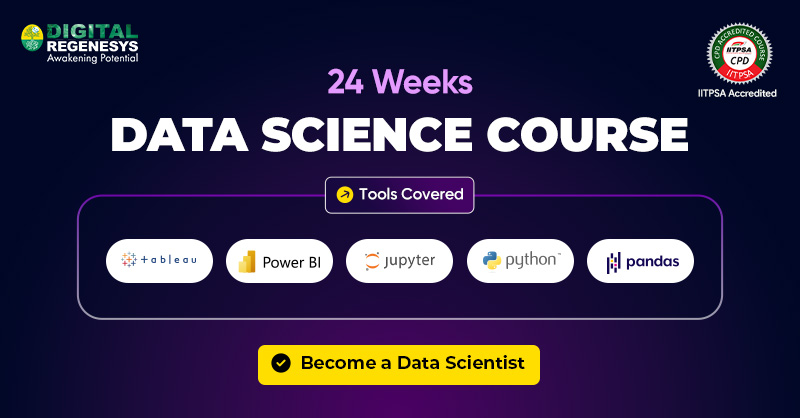Short Data Science Courses in South Africa for Quick Skills Development

Data science is reshaping industries, creating opportunities for professionals who can analyse data and draw meaningful insights. However, not everyone has the time or resources to pursue long-term degrees.
This is where short data science courses in South Africa offer a practical solution, providing a pathway to acquire key skills efficiently.
In this article, we examine how these courses enable learners to develop practical knowledge, work on real-world projects, and enhance their career prospects. Whether you are a beginner aiming to build foundational knowledge through beginner data science courses in SA or a professional seeking flexible learning options, these courses provide structured training and hands-on experience.
By concentrating on essential tools and industry applications, learners can gain valuable competencies without committing to months or years of study.
Why You Should Consider Short Data Science Courses in South Africa
Short courses provide a time-efficient way to acquire in-demand skills. They focus on essential concepts and practical tools while avoiding lengthy academic pathways. Many courses offer project-based learning, which allows learners to apply theoretical knowledge immediately.
Additionally, flexible scheduling options, including online delivery and weekend workshops, make these courses accessible for working professionals. Cost-effectiveness and targeted skill development make them attractive alternatives to full-time degrees. Completing a course demonstrates commitment to learning, boosting employability and professional credibility.
Here are the main reasons learners choose these courses:
- Time efficiency: Courses deliver core skills within weeks or a few months, saving learners from prolonged study.
- Focused learning: Emphasis is on practical skills, including data analysis, visualisation, and basic machine learning.
- Flexible schedules: Options such as online courses or weekend data science workshops in SA enable learners to balance work and study.
- Cost-effective: Short courses generally cost less than full-degree programs, offering value for money.
- Career advantage: Completing a recognised course enhances resumes and signals industry-relevant capabilities.
Read more on What is a Data Science Course? Learn Skills and Benefits.

Who Can Benefit from Short Data Science Courses for Quick Skills
These courses cater to individuals from various backgrounds seeking skill development or career advancement. Beginners can build foundational knowledge, while professionals can enhance competencies without leaving their current roles.
Students and graduates can complement academic learning with practical experience. Entrepreneurs and business analysts gain skills that support data-driven decisions. Overall, these courses offer a flexible learning path for individuals seeking to enter or advance in the field of data science.
Here are the main learners who benefit most:
- Beginners: Individuals can start with beginner data science courses in SA to develop essential analytics skills.
- Working professionals: Employees can pursue weekend data science workshops in SA to upgrade skills without disrupting schedules.
- Career changers: Those switching fields can gain expertise quickly through fast-track data science programs in SA.
- Students and graduates: Practical exposure via hands-on data science workshops in South Africa complements academic knowledge.
- Entrepreneurs and analysts: Learning to interpret and visualise data enhances decision-making and business strategy.
Structure and Content of Short-Term Data Science Training in South Africa
Short-term courses provide structured learning that combines theory, practical application, and real-world projects. Curriculum focuses on essential skills such as data cleaning, analysis, visualisation, and introductory machine learning. Learners become familiar with tools such as Python, R, and SQL.
Many courses include exercises, assessments, and project work to reinforce learning and ensure retention. The duration varies from a few days to several weeks, depending on intensity. Courses are designed to be accessible and practical, ensuring that learners can apply their skills immediately in professional or academic settings.
Here are the key elements typically included in the course structure:
These modules provide foundational knowledge in data science, focusing on programming skills and basic data handling. Learners gain hands-on experience and practical understanding of Python for analytics and data-driven applications. The aim is to establish a solid foundation for more advanced topics in the later stages of the course.
- Python Programming Foundations
- Applied Python for Data Applications
1. Intermediate Data Science Modules
The intermediate modules expand on data analysis and visualisation skills. Learners explore datasets, uncover insights, and create impactful visual reports. This stage focuses on the practical application of analytical techniques and business intelligence tools to support data-driven decision-making.
- Data Exploration & Insight
- Business Intelligence & Data Visualisation with Power BI
2. Advanced Data Science Modules
Advanced modules focus on predictive analytics and project deployment. Learners apply machine learning algorithms to real datasets and implement data science projects from start to finish. The aim is to develop industry-ready skills for solving complex business problems using advanced analytics and data science.
- Machine Learning for Predictive Analytics
- Data Science Project Deployment
3. Self-Paced Modules
Self-paced modules enable learners to develop additional skills at their own pace and convenience. These include essential tools for data management, analysis, and visualisation, giving learners flexibility to strengthen competencies and explore technologies that complement their primary learning path.
- Spreadsheet Essentials with Excel
- Data Management Using MySQL, Tableau and MongoDB
Read more on What Qualifications Do You Need To Be A Data Scientist?
Practical Projects Included in Short Data Science Courses in South Africa
Hands-on projects are essential for grasping concepts and developing confidence. Learners apply techniques to analyse datasets, generate insights, and present results. Projects simulate professional scenarios, helping students develop problem-solving skills.
Completing practical work also strengthens portfolios, showcasing abilities to potential employers. These exercises ensure learners are not only familiar with theory but can also execute tasks using industry-standard tools and methods, preparing them for real-world data challenges.
Here are examples of practical components in these courses:
- Data analysis projects: Focus on cleaning, processing, and analysing datasets to extract meaningful insights.
- Predictive modelling exercises: Apply algorithms to forecast trends and outcomes in sample business scenarios.
- Visualisation tasks: Create charts and dashboards to clearly and effectively communicate findings.
- Capstone projects: Integrate multiple skills to provide a holistic understanding of data challenges.
- Collaborative work: Group projects foster teamwork, effective communication, and collaborative problem-solving skills.
Industry Relevance of Short Data Science Courses in South Africa
Short courses align with industry requirements, teaching skills that employers actively seek. Knowledge of data cleaning, visualisation, and predictive modelling is valuable across finance, healthcare, retail, and technology sectors. By focusing on practical applications, these courses ensure learners are prepared for workplace challenges.
Exposure to tools like Python ,R, and SQL gives learners a competitive edge. Additionally, understanding emerging trends in analytics and machine learning positions students to meet the evolving demands of the professional world.
Here’s how these courses stay aligned with industry needs:
- Practical skill focus: Emphasis on real-world tools and techniques used professionally.
- Project-based learning: Working with real datasets mirrors business challenges.
- Current technologies: Skills in Python, R, SQL, and visualisation software ensure relevance.
- Market-ready skills: Competencies such as data cleaning, analysis, and predictive modelling are in high demand.
- Trend awareness: Courses incorporate industry trends such as AI and advanced analytics.
Read more on How to Get Into a Data Science Career?- Find Out the Best Steps!
Cost and Duration of Short Data Science Courses in South Africa
Costs and duration vary depending on course depth, format, and intensity. Short-term options may last 1–2 weeks, while weekend courses offer part-time learning over several weekends. Online delivery often reduces costs by eliminating the need for travel or accommodation.
These courses are generally more affordable than full-time degrees yet provide comparable skill acquisition. Learners can expect a balance of value, flexibility, and practical exposure, making short courses a cost-effective way to develop in-demand competencies in a short period.
Typical details regarding cost and duration include:
- Short-term intensive courses: Options like a 2-week data science course in SA provide concentrated learning.
- Weekend learning: Weekend data science workshops in SA allow learners to balance work and study.
- Online courses: Flexible online formats reduce logistical challenges and costs.
- Affordable pricing: Lower fees compared to degree programs make courses accessible.
- Flexible schedules: Courses accommodate part-time learners or those with other commitments.
Read more on What Factors Contribute To The Fees Of A Data Science Course?
Job Opportunities and Career Growth After Completing Short Data Science Courses
Completing a short course equips learners with practical, in-demand skills that are highly valued in the workforce. Employers value candidates capable of analysing data, producing visualisations, and supporting business decisions. Graduates can pursue roles like data analyst, business analyst, or junior data scientist. Certificates from recognised courses enhance professional credibility.
Professionals can also leverage these courses to upskill, explore new fields, or transition into analytics-focused positions. By demonstrating applied competencies, learners strengthen their employability and career progression prospects.
Key benefits for career advancement include:
- Entry-level roles: Qualify for positions such as data analyst or junior data scientist.
- Skill recognition: Certificates add credibility to professional profiles.
- Industry applicability: Skills are applicable across multiple sectors, enhancing employability.
- Portfolio development: Practical projects demonstrate capability to employers.
- Upskilling opportunities: Professionals can expand competencies and explore analytics areas.
Ideal Learners for Short-Term Data Science Courses in South Africa
These courses cater to a diverse range of learners. Beginners gain foundational knowledge, while professionals enhance competencies for current roles. Students and graduates benefit from practical experience that complements their academic studies.
Career changers acquire targeted skills to pivot into analytics fields. Individuals seeking hands-on experience and project-based learning find short courses particularly useful. Overall, they offer a flexible and efficient path for anyone seeking to build or enhance their data science skills.
Learners who benefit most include:
- Beginners: Take beginner data science courses in SA to build core analytics skills.
- Professionals: Use skill-focused data science training in SA to enhance current roles.
- Career changers: Benefit from fast-track data science programs in SA for quick skill acquisition.
- Students and graduates: Gain practical exposure via local intensive data science training in SA.
- Hands-on learners: Engage in practical data science bootcamps in SA to develop applied expertise.
Conclusion
Short data science courses in South Africa offer a practical, efficient, and cost-effective way to develop valuable skills. They combine theory, hands-on exercises, and real-world projects, preparing learners for the workforce or career advancement.
Flexible options, such as weekend data science work shops in SA and 2-week data science courses in SA, allow individuals to choose schedules that suit their needs.
Digital Regenesys offers a Data Science Certificate Course that covers data analysis, visualisation, and machine learning. The course offers practical exercises and flexible online access, providing learners with the tools to apply their knowledge effectively.
It is ideal for anyone seeking to enhance their analytics capabilities and acquire industry-relevant skills.
Visit the website to discover more insights, explore resources, and learn about the latest opportunities.
Last Updated: 20 September 2025
